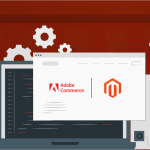Magento Open Source Vs Magento Commerce – PICK YOUR EDITION
Last Updated | July 27, 2023
Table of Contents
Magento is one of the leading eCommerce web development platforms. The platform brings in the advanced level of customization options and features that have helped it dominate as the preferred eCommerce web development platform. Today, over 800,000 eCommerce websites, including some of the most prominent enterprises, use the Magento platform to dominate the eCommerce market.
Generally, when we talk about Magento, most people refer to the open-source version of Magento. However, the platform offers two distinctive versions aimed at different target markets, including Magento Open Source (often referred to as the Community Edition) and Magento Commerce (also known as Enterprise Edition).
For businesses looking to get started with Magento eCommerce web development, it’s essential to choose the right edition between Magento Open Source vs Commerce. That’s because each of these editions offers unique features and functionalities; suited to individual business needs.
If you are also looking to get more information about Magento open source vs commerce, keep reading. Below, we have a detailed comparison between the two Magento editions to help you make an intelligent and informed choice.
So, let’s begin.
Magento Open Source vs Commerce – Which one wins?
Before we dive into the technical details of the two editions, let’s briefly compare the Magento open source vs. commerce to see what each of these bring to the table for eCommerce businesses;
- Open Source Edition: it’s the most commonly used free software that comes with limited learning resources. However, the open-source edition is known for a massive inventory of valuable extensions and large community support to help businesses get started.
- Commerce Edition: A premium paid edition that’s exclusively built to help businesses implement full-scale functionalities of the platform and optimize the scales of deployment. Most of the time, it is preferred for Magento B2B development websites.
Ok, now let’s get dive into more technical details…
What is Magento Open Source?
Magento open source or the community edition is the most widely used free version of Magento. It is offered as a free to download (open source) platform, making it a prevalent choice for small and medium businesses looking for high-performing and feature-rich eCommerce platforms. Given the extensive range of extensions and customization options available, it definitely sits right at the helm as the leading eCommerce development platform.
While Magento open source is mainly linked to small and medium businesses, in reality, the platform does offer everything an enterprise-level customer would want. In fact, the open-source version is already used by some of the biggest global enterprises to maintain their online presence. Some of the benefits of the open-source edition over the Magento commerce edition remain lightweight (since it doesn’t come with the heavy modules that come with the commerce edition) and innovative licensing structures.
Magento open source allows online merchants to develop customized solutions for their unique business needs. This is one reason why the open-source version has remained hugely popular amongst the large online merchants. With a reliable infrastructure, extensive community support, and widely available development services, Magento open-source surely qualifies as the best eCommerce web development platform to meet the needs of online merchants.
In general, the Magento open-source system is definitely an excellent platform that is ideally suited equally for SMBs and enterprise-level retailers. The only downside associated with the open-source platform is the higher cost of development. Magento 2 development company would typically cost hundreds of thousands of dollars for a medium-sized eCommerce website. This means that the development costs may be too high for the liking of most small and medium businesses.
Nonetheless, some of the worth-mentioned enterprise-level retailers using Magento open-source includes;
- Erdem
- PrettyLittleThing
- Bucherer
- Christian Louboutin
- Brand Alley
- Tog 2
- The V&A
- PMT Music
What is Magento Commerce?
Magento Commerce was initially marketed as the Magento Enterprise Edition (EE), which clearly states the targeted market of the edition. Originally, the commerce edition was aimed at enterprise-level retailers looking for premium support and a diversified set of functionalities.
The most apparent difference between Magento open source vs commerce is that while the earlier is free to install, the latter comes with a hefty price tag of USD 24,000 per year. Magento commerce is offered in two different models: a platform-as-a-service (PaaS) solution or an on-premise solution. Interestingly, the code base for both open-source and commerce editions is identical. However, the cloud platform does receive automatic updates.
One thing worth mentioning is that Magento has considerably worked to strengthen its commerce edition over the years. The platform has been reinforced with various advanced native features; aimed to add much more value for retailers (making Magento commerce a preferred choice for retailers).
Dedicated B2B module, content staging, preview, and page builders are some of the advanced features that make Magento commerce a better option for large retailers. Some of the other worth-mentioning features of Magento commerce include robust Magento shipping module, Magento Business Intelligence (BI), features like RMA, and various other pre-installed modules.
Apart from built-in modules, there are various other customized modules available; however, these would just add up to the total costs of developing and maintaining the platform.
Some of the worth-mentioning enterprise-level platforms using Magento commerce includes;
- Bulk Powders
- End Clothing
- Paperchase
- Paul Smith
- Helly Hansen
- com
- Brewdog
Magento Open Source Vs Commerce: Features
As mentioned above, the codebase for Magento open-source and Magento commerce is the same. However, Magento commerce does include various additional features (as we have already mentioned in the above section). The additional features and functionalities offered adds the extra push to the functional capabilities of the edition over the open-source edition. However, certain features aren’t as robust, and below we will be covering an honest comparison of Magento open source vs Magento commerce features.
– Elastic Search (on-site search capabilities):
Magento offers an Elastic search feature for both of its editions; however, the search feature provided on the commerce edition is slightly better than the open-source edition. Still, the feature lags significantly in terms of efficiency and utility for what an enterprise-level retailer would like it to be. That’s one reason why most of the large online merchants using Magento Commerce resort to using more advanced on-site search extensions like Algolia or Klevu that offer much better features.
Thereby, there is no much difference between open source and community editions; since retailers would ultimately have to resort to third-party extensions to leverage advanced customized features.
– B2B / wholesale functionality
Honestly, the B2B/wholesale functionality is one module that sets the Magento commerce edition ways ahead compared to the open-source edition. The module was only recently added last year and brought high-utility features and functionalities for B2B merchants, including;
- Quick checkout options
- RFQ functionality
- Credit limits
- Price quoting and negotiations
- Customer-specific payment options
- User roles
- Support for quick purchases
- Purchasing limits; and
- Many more
These are some of the worth-mentioning features that definitely add much flexibility and value for B2B businesses. Additionally, B2B merchants using Magento Commerce can also extend the functionality to meet their unique business needs.
Since there is no such dedicated module for B2B businesses in Magento’s open-source edition, Magento Commerce is the clear winner in this regard.
– Page Builder
Like the B2B module, page builder is another advanced feature available only for the Magento Commerce edition. The page builder functionality allows online merchants to effectively and efficiently manage the store’s content and templates. The page builder feature comes with a drag-and-drop content management option that vastly improves the content management capabilities for online merchants. The functionalities of page builders can also be extended for all page templates by hiring a professional development company.
Again, since this feature is exclusive to Magento commerce, the edition takes the lead.
– Content staging
Content staging, preview, and scheduling functionality have been available on the Magento platform for quite some time. However, only in the last year has Magento made the module stable and better integrated for optimum use. The module enables online merchants to manage content changes better on the website by previewing and scheduling the content changes and other tasks. Content staging is a high-utility tool that’s a “must” for all eCommerce websites, and thereby Magento commerce again takes the lead here.
Magento Open Source Vs Commerce: Pricing
As mentioned above, Magento open source is completely free to download and install. However, you would require to spend money on hosting, design, development, and customization of online stores.
As far as Magento Commerce pricing is concerned, things are a bit more complex in this case. Magento commerce is offered as a tiered system that’s essentially linked to your store’s gross merchandise value (GMV).
To put it simply, apart from the basic monthly pricing, the cost of Magento commerce increase after your store crosses USD 1 million monthly revenue. Also, as an on-premise solution, you will have to manage expenses for hosting separately, depending on the company you choose.
Alternatively, if you decide to move on with the Magento Commerce Cloud solution, you will be paying a monthly subscription fee, which will increase as your store crosses USD 1 million monthly revenue. However, in this case, you will save on hosting that comes as part of the package.
Now, we haven’t put up definite Magento costs upfront because the final price of the Magento commerce package will depend on your eCommerce store needs.
Magento Open Source Vs Commerce: Security
In today’s digital era, cybersecurity remains a priority for all digital businesses, and the same is true for eCommerce stores. To put it simply, no matter how much effort and resources you put into the design and customization of the store, if it lacks security measures, you will likely regret it.
Now, with Magento commerce, you won’t have to worry about this all-important aspect at least. Unlike Magento open source, where you will be solely responsible for security measures, Magento commerce comes with PCI compliant. The platform also supports credit card tokenization, which makes it a highly secure platform for online transactions.
Some of the worth-mentioning security features of Magento commerce include;
- Secure networking connectivity
- DDOS protection
- Firewalls
Apart from robust built-in security features, Magento commerce also gives you access to dedicated technical support, which helps you further protect your store from any online breaches.
Alternatively, nothing of this sort comes with Magento open source. As the business owner, you will solely be responsible for protecting your store from all cybersecurity threats.
This is perhaps enough of a reason to choose the Magento commerce version over Magento open source.
Magento Open Source Vs Commerce: B2B Functionality
Perhaps, the most significant advantage of Magento commerce over Magento open source is the availability of a dedicated B2B module.
The B2B module offered by Magento commerce comes packed with various high-utility features, including;
- Quick checkouts
- Credit limits
- Customer-specific purchasing limits
- User roles
- Customer-specific payment options
- RFQ
- Price quoting
- Customer-specific product catalogs
- Purchasing limits; and
- Various other
Therefore, if yours is a B2B company, Magento Commerce is a definite choice to gain the competitive edge you need to stand out amongst the crowd.
Final Words
Over the years, Magento has dominated the eCommerce industry by offering online merchants incredible flexibility, powerful functionalities, and high-level customization options. As for our Magento open source vs commerce battle, we believe each of these editions brings invaluable tools for eCommerce businesses. Magento open source is a high-potential platform that brings in various powerful tools and advanced functionalities to help eCommerce stores succeed.
On the other hand, Magento Commerce takes the functionalities and features to the next level by offering even better options coupled with specialized modules like B2B functionality and a vast range of management tools to help businesses expand to new horizons.
Each of the Magento editions is highly effective for different businesses. For instance, Magento open source is a better option for small and medium-sized businesses entering that aren’t expecting rapid business expansion in the near future. Alternatively, Magento commerce is ideal for large enterprises and B2B businesses looking to expand quickly to new horizons.
FAQs:
1)Which Magento Edition Is Right for Your Business?
If we look at the features and functionalities of Magento open source vs commerce, it is clear that Magento open source is better suited for small and medium-sized businesses that aren’t looking for quick expansion. Alternatively, Magento commerce brings in high-utility features with better management tools and higher scalability options to help large enterprises and specialized businesses (B2B business models) succeed in the eCommerce market.
2) Is Magento Commerce affordable for small businesses?
No. Magento commerce is a premium platform with annual prices starting at USD 22,000. This makes it too expensive for the liking of small businesses.
3) How is Magento Open Source good for your websites?
Magento open source is an excellent platform for eCommerce businesses looking to excel in the online marketplace. The platform offers online merchants the flexibility, functionality, and scalability options that ensure the sustainable growth of businesses. Magento integration services further ensure that online merchants are able to meet unique business needs and continue to dominate the market.
4) How much does it cost to design the Magento website?
The website development costs depend on the different Magento and Shopify website design pricing plans. On average, a basic website costs anything between $20,000 and $45,000. Within this price range, you can get a stable and high-quality eCommerce website. Not to forget, multiple customized features can be added according to your needs.
READ RELATED ARTICLES:
Magento 2 Community vs Magento Enterprise
Magento vs Shopify: A Complete Comparison
Magento vs Opencart: Which is best for an eCommerce Website?












